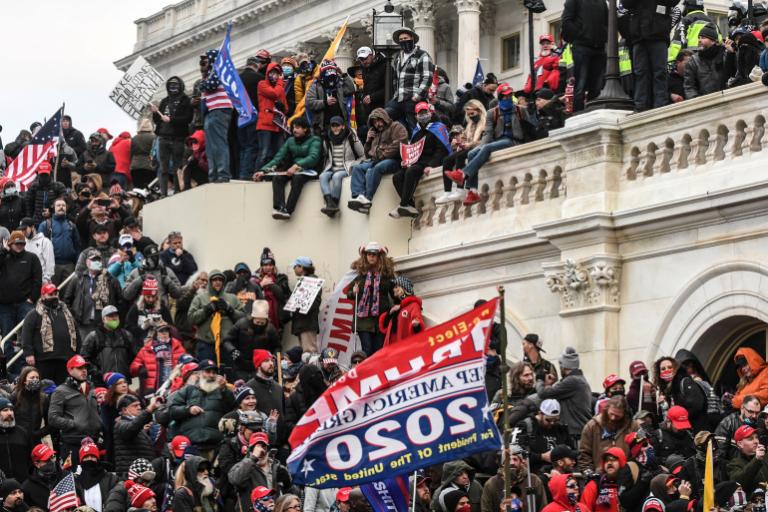Today is the first day of the impeachment trial of former President Donald J. Trump in the United States Senate, the second such trial in thirteen months. Five weeks ago tomorrow, the very same Capitol building in which the trial is being held was stormed, occupied, and desecrated by a white mob of insurrectionists with one goal in mind—to stop the certification by Congress of the results of last November’s election result for President and Vice President. It’s a good day to reflect on that infamous January 6th, with an eye to what each of us can learn from it that is relevant to our lives going forward.

Last Friday, at a House of Representatives event organized by Rep. Alexandria Ocasio-Cortez (D-NY) organized to provide members of Congress to share their experiences of the January 6th mob occupation of the Capitol, Rep. Dean Phillips (D-MN) closed his comments as follows:
I close with an invitation – a hopeful invitation – to everyone watching or listening, whether you experienced January 6th in this room, whether you were barricaded in an office across the street, or whether you experienced it through a television screen, please do not allow that day to change you for the worse – rather find something in it to improve yourself, to improve our country, and to improve our world.
Undoubtedly a tall order for anyone. Exactly how is that going to happen?
January 6, 2021 is one of the dates that will burn itself indelibly into everyone’s memory. Just as each of us can answer the question “Where were you on 9/11?” in great detail, and just as those among of us of a certain age can similarly answer “What were you doing when you heard that JFK had been shot?” as if it happened yesterday, “Where were you and what were you doing when you first learned that the Capitol had been occupied by a seditious mob?” will, in the future, produce endless memories and multi-layered stories.
January 6th was my second day in quarantine after learning on January 5th that my biweekly Covid-19 test had turned up positive. Fortunately, my symptoms were no worse than mild cold symptoms and moderate fatigue. Jeanne was away in Miami for work for another day, and I was stuck in the house with an elderly dachshund who loves her mother and tolerates me. I knew that Congress was going to be certifying the election results, despite the manic efforts of the Orange Menace over the previous two months, but also knew that that the process was likely to last for hours on end.
With that in mind, I decided to put the finishing touches on the syllabus for one of my Spring courses, checking occasionally on what was going on in Congress by reading comments in real time from various reporters on the NY Times web page. Within thirty minutes of the beginning of the certification process, reporters began posting things like “a large crowd has stormed the Capitol,” “They’re moving up the stairs,” and, a few minutes later, “They’re in the rotunda!”
Setting my syllabus plans aside, I turned on the television—and spent the next several hours with my stomach in knots as I watched a seditious mob occupy the Capitol, offices, and the House of Representatives. All of us saw it; few (if any) of us knew in the moment just how serious the situation it was and just how close it came to being far, far worse. This was the first in a remarkable series of Wednesdays. One week later President Donald J. Trump was impeached for the second time, followed the next Wednesday by the inauguration of Joseph R. Biden as the 46th President of the United States. Someone is undoubtedly already writing a book and/or planning a Netflix or Amazon series called “Three Wednesdays in January.”
Over the weeks since January 6th, I have heard and read many eyewitness testimonials from Senators, Congressional representatives, and others who work in the Capitol describing what the events were like, including their fear, confusion, and anger in real time. The story that has struck me most profoundly was from Rep. Dean Phillips. I began this post with the conclusion of his remarks at the event last Friday; what he said in the minutes preceding that conclusion was remarkable.
After describing the sounds of violence just outside the chamber doors and the need to put on gas masks, the helpless feeling of knowing that no one in that chamber had access to anything with which to defend themselves, and the realization—expressed by many in the Capitol that day—that he might never see his loved ones again, Rep. Phillips turns his story on its head.
But I’m not here this evening seeking sympathy – rather to make a public apology.
Recognizing that we were sitting ducks as the chamber was about to be breached, I screamed to my colleagues to follow me across the aisle to the Republican side of the chamber “so we could blend in.”
“So we could blend in.”
I felt that the insurrectionists who were trying to break down the doors would spare us if they simply mistook us for Republicans.
Consider what Rep. Phillips is saying. His assumptions are that
- The mob just outside the door is looking for Democrats, a justifiable assumption since the mob is there to try to “Stop the Steal,” to interrupt and perhaps permanently stop the certification of the election of someone other than Donald Trump.
- It will be safer for the representatives who are Democrats to “blend in” with their Republican colleagues, given that Democrats and Republicans are not generally distinguishable on the basis of physical appearance.
But within moments I recognized that “blending in” was not an option for my colleagues of color. So I’m here tonight to say to my brothers and sisters in Congress and all around the country; I AM SORRY.
I had not understood – really understood – what privilege really means.
It took a violent mob of insurrectionists and a lightning bolt moment in this very room – but now I know. Now I really know.
What exactly is Rep. Phillips apologizing for? What is he saying “I am sorry” for? He is apologizing for a failure to be aware of what has been right in front of him for his whole life, something that is right in front of every American citizen every day—some people are privileged in innumerable ways, and safer in their daily lives, in our country simply because of the color of their skin. The mob outside the House chamber, a crowd of almost exclusively white people, clearly had little concern for what might happen to them because of their dangerous and unlawful activity. Why? Because they were white. Rep. Phillips realized that his strategy of “blending in” with the Republicans wouldn’t work . . . because many of his fellow Democrats are not white.
The next time race issues show up on the syllabus in my ethics course, I will introduce the topic by playing Rep. Phillips’ remarks. As many have said over the years, racism is America’s original sin. The Representative challenges each of us to “find something in [the events of January 6th] to improve yourself, to improve our country, and to improve our world.” It is much easier to demonize and deflect, saying that “those people aren’t who I am, who we are.” But that seditious mob is exactly who we are. We can begin to heal only when we are willing to face the truth—as Rep. Phillips so eloquently and honestly said.













